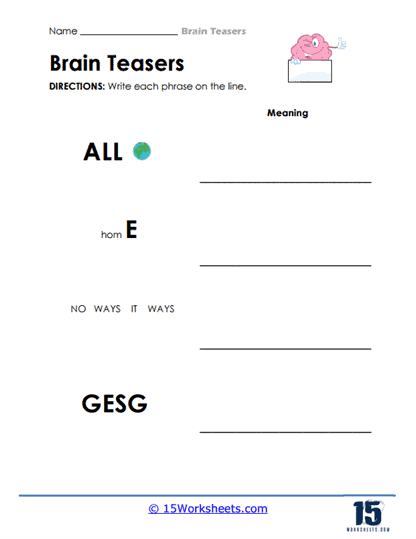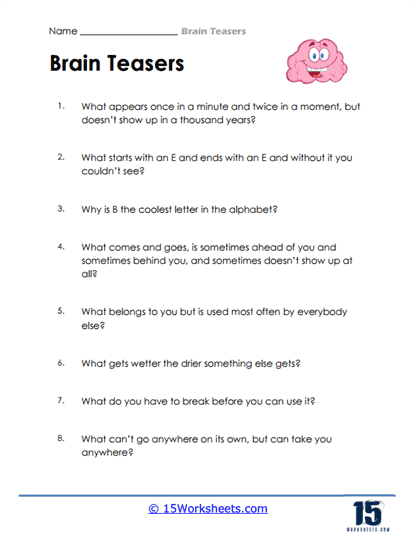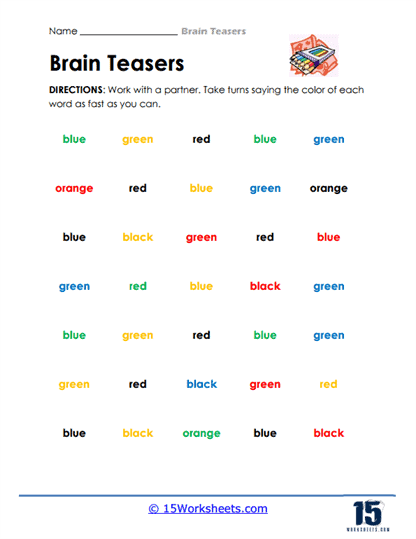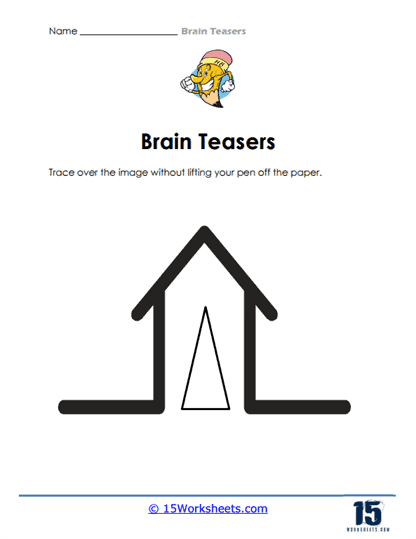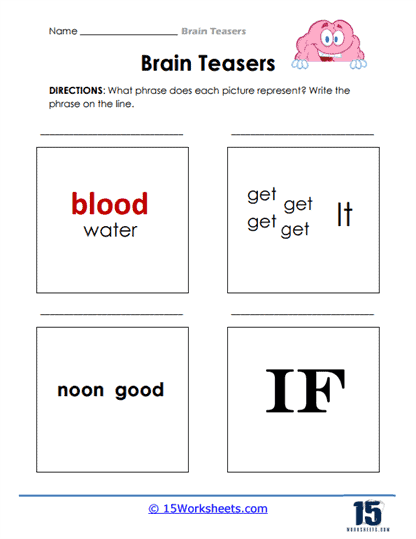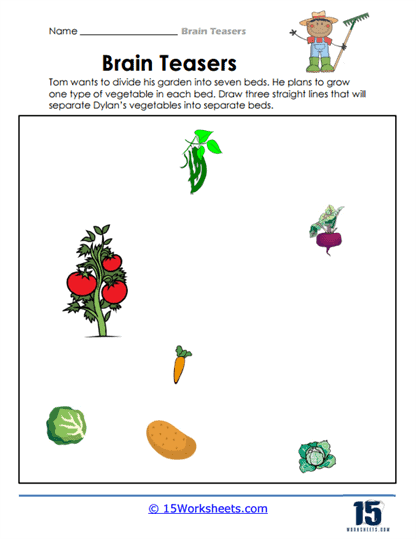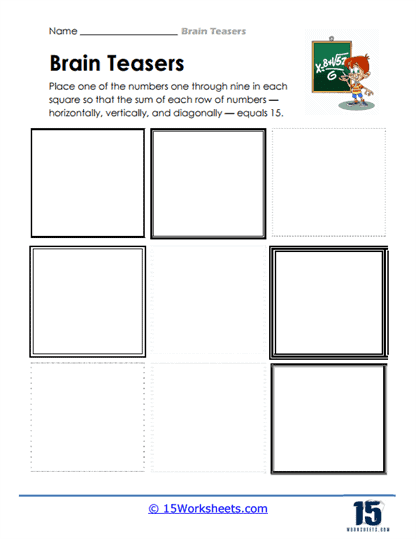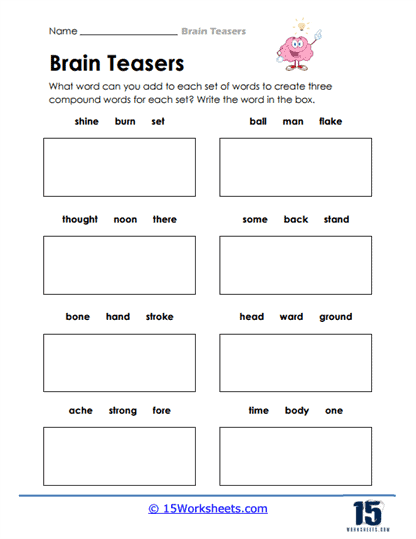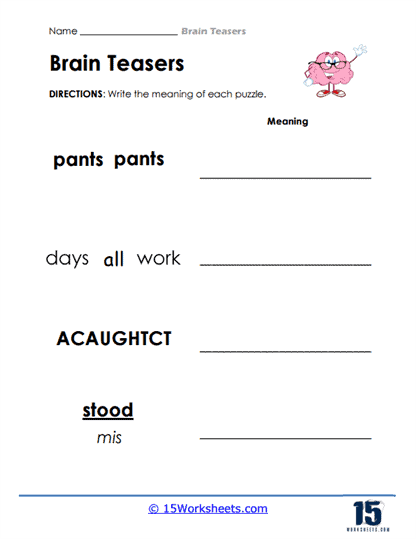Brain Teasers Worksheets
About These 15 Worksheets
This collection of worksheets is a versatile and engaging resource designed to challenge students’ critical thinking, logic, and problem-solving skills through a variety of puzzles and riddles. This collection features a range of activities that are both fun and educational, making them ideal for classroom use, homeschooling, or independent practice. Each worksheet is thoughtfully designed to capture students’ attention while encouraging them to think creatively and analytically. With worksheets available in easy-to-view, download, and print PDF formats, this collection offers convenience and flexibility for teachers, parents, and students alike.
One of the key features of this collection is the variety of brain teasers that cater to different learning styles and skill levels. For instance, the “Remove Carrots” puzzles challenge students to strategically remove certain elements to create specific shapes, honing their spatial reasoning and problem-solving skills. These visual puzzles require students to think ahead and plan their moves carefully, making them excellent exercises for developing logical thinking. Another example is the classic dot-connecting puzzle, where students must draw four straight lines to connect all dots without lifting their pencil. This task encourages out-of-the-box thinking and introduces students to the concept of efficiency in problem-solving.
The collection also includes traditional riddle-based worksheets that prompt students to solve verbal and mathematical puzzles. For example, students might encounter questions such as “What appears twice in morning, twice in evening, but only once at night?” or “What number can you multiply with any other number and always get the same answer?” These riddles are designed to engage students’ curiosity and encourage lateral thinking. By working through these puzzles, students practice critical reading and comprehension skills, as well as mathematical reasoning, all while having fun with wordplay and number games.
Types of Brain Teasers in the Collection
This series isn’t just worksheets; it’s a brain buffet. Students will embark on a “Carrot Conundrum” that makes vegetables suspiciously intelligent, brave a “Riddle Quest” full of logic-defying questions, and attempt to solve the secrets of the “Magic Grid“-which may or may not be powered by ancient math sorcery. There’s also the “Garden Puzzle,” where plants are as puzzling as people, and “Color Code,” where cracking the rainbow means victory.
Need more mental mayhem? Dive into “Mind Puzzles” and “Puzzle Play,” where thinking sideways is the only way forward. Students will hunt squares in “Square Hunt” (spoiler: there are more than four), link up tricky terms in “Word Links,” and follow mysterious lines in “Line Logic“-a worksheet that feels like trying to follow a toddler’s explanation of time travel. They’ll test their artistic detective skills with “Dot Connect,” and challenge their phrase-decoding prowess in not one, not two, but three different versions of “Phrase Puzzles” and “Puzzle Phrases.” That’s right-these phrase puzzles were so fiendishly fun, we had to clone them.
By the end, your students will be reasoning like Sherlock, solving like Scooby-Doo (with fewer snacks), and maybe even learning to love a good mental workout. This collection is perfect for classrooms, rainy days, or anytime you want your students to look thoughtfully confused. Whether they succeed gloriously or get stuck hilariously, every worksheet sharpens skills and tickles the funny bone. Just be warned: side effects may include furrowed brows, spontaneous “Aha!” moments, and an unstoppable urge to solve just one more puzzle.
The collection’s emphasis on both creativity and logic ensures that students are developing a well-rounded set of skills. By regularly engaging with these puzzles, students will improve their ability to approach problems from different angles, think critically about the information presented to them, and develop strategies for arriving at solutions. These are skills that are not only valuable in the classroom but also in everyday life, as they equip students to handle challenges with confidence and resilience.
What Are Brain Teasers?
Brain teasers are puzzles or problems that require creative thinking, logic, and problem-solving skills to solve. Unlike straightforward questions that may have a clear and immediate answer, brain teasers often involve lateral thinking, where the solution is not always obvious and may require looking at the problem from a different perspective. These puzzles can take many forms, including riddles, visual puzzles, word games, and mathematical challenges. They are designed to stimulate the brain, encouraging individuals to think critically and analytically.
The primary purpose of brain teasers is to challenge the mind and improve cognitive abilities. By engaging with these puzzles, individuals are prompted to use their reasoning skills, enhance their memory, and develop their concentration. Brain teasers often require solvers to break away from conventional thinking patterns, which helps in developing flexibility in thought processes. This ability to approach problems from various angles is a valuable skill, not just in academics, but also in everyday decision-making and problem-solving situations.
Brain teasers are beneficial in enhancing both verbal and non-verbal skills. For instance, riddles and word puzzles improve language skills, vocabulary, and comprehension, while visual puzzles and spatial reasoning challenges enhance the ability to interpret and manipulate shapes and patterns. Mathematical brain teasers, on the other hand, reinforce arithmetic skills and logical reasoning. The diversity in the types of brain teasers available ensures that different areas of cognitive function are exercised, making them a well-rounded tool for mental development.
In addition to cognitive benefits, brain teasers also serve as a source of entertainment and motivation. The process of solving a challenging puzzle and arriving at the correct solution can be highly satisfying, providing a sense of accomplishment. This rewarding experience can boost an individual’s confidence and encourage a positive attitude toward learning and problem-solving. For students, brain teasers can make learning more engaging and enjoyable, fostering a love for challenges and intellectual curiosity.






